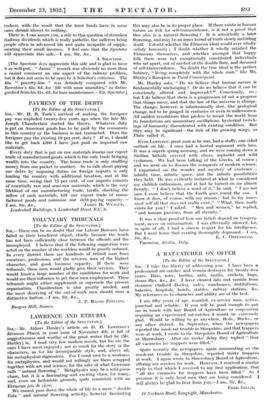LAWRENCE AND ETRURIA
[To the Editor of the SPECTATOR.] Suf„,—Mr. Aldous Huxley's article on D. H. Lawrence's Etruscan Places, in your issue of November 4th, is full of suggestiveness and worthy of the great writer that he (Mr. Huxley) is. I read very few modern novels, but his are the ones I have most enjoyed ; not so much for the story or the characters, as for his incomparable style, and, above all, his metaphysical digressions. For I must own to a weakness . for metaphysics, and would not willingly see them scrapped together with art and science, for the sake of what Lawrence calls "natural flowering." Metaphysics may be a wild-goose chase, but it is a fascinating and exciting chase for many, and, even on hedonistic grounds, quite consistent with an Etruscan joie de rivre.
We cannot pare down the whole of life to a mere "double flute" and natural flowering activity, however fascinating
this may also be in its proper place. If there exists in human nature an itch for self-transcendence, is it not a proof that this also is a natural flowering ? It is admittedly a later flowering, and may be an inner kernel of truth slowly unfolding itself. I doubt whether the Etruscan ideal would ever wholly satisfy humanity ; I doubt whether it wholly satisfied the Etruscans themselves, and whether amongst that happy folk there were not exceptionally constituted individuals who sat apart, out of earshot of the double flute, and dreamed of self-transcendence. No doubt the true ideal is the perfect balance, "living completely with the whole man," like Mr. Huxley's Rampion in Point Counterpoint.
Mr. Huxley asks, "Do we believe that human nature is fundamentally unchanging ? Or do we believe that it can be consciously altered and improved?" Consciously, no ; but I do believe that there is a progression (if not a progress that things move, and that the law of the universe is change. The change, however, is infinitesimally slow, like geological change, not to be gauged in centuries or even in millenniums. All sudden .revolutions that profess to recast the world from its foundations are momentary oscillations, hysterical twitch- ings of humanity discontented with existing condition. But they may be significant—the itch of the growing wings, as Plato called it.
Even Lawrence, great man as he was, had a stuffy, one-sided outlook on life. I once had a heated argument with him. It was a superb spring morning, and we were coming down a Sicilian hillside covered with olives, asphodel and wild cyclamen. We had been talking of the Greeks, of course ; and we went on to discuss the conquests of modern science. I expatiated on the wonder and mystery of existence— infinite time, infinite space, and the infinite possibilities they held. He was evidently irritated at what he considered my childish enthusiasm, and at last he turned on me almost fiercely. "I don't believe a word of it," he said. "I am not sure I even believe that the Earth goes round the sun. I know it does, of course, with my reason ; but to my inner- niost self all that does not really exist." "What, then, really exists for you?" I asked. "Men and women," he replied, "and human passions, from all eternity."
It was a clear proof of how our beliefs depend on tempera- ment, never on ratiocination. I was effectually silenced, for, in spite of all, I had a sincere respect for his intelligence. But I went home that evening thoroughly depressed.—! am,


























 Previous page
Previous page